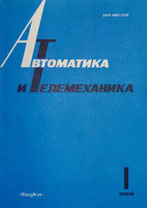|
This article is cited in 10 scientific papers (total in 10 papers)
Control in Technical Systems
Approximate evaluation of the efficiency of synchronous and self-timed methodologies in problems of designing failure-tolerant computing and control systems
I. A. Sokolov, Y. A. Stepchenkov, Y. V. Rogdestvenski, Y. G. Diachenko
Federal Research Center “Computer Science and Control,” Russian Academy
of Sciences, Moscow, 119333 Russia
Abstract:
The paper deals with a comparative analysis of the efficiency of using synchronous and self-timed (ST) methodologies in the design of failure-tolerant computing and control systems based on complementary metal–oxide–semiconductor (CMOS) technology. The issues of failure tolerance of technical control means are considered in detail using examples of digital circuits of various types. A significant increase (by a factor of 1.2–1.8) in the time of failure-free operation of ST circuits in comparison with synchronous counterparts is confirmed. The most significant features of ST circuitry, which provide an increase in the failure tolerance of ST systems, are highlighted. Circuitry methods are proposed for increasing the failure tolerance of ST control systems, increasing the time of failure-free operation of combinational ST circuits up to 4.0 times and sequential ST circuits up to 7.1 times.
Keywords:
hardware, failure tolerance, failure, synchronous circuit, self-timed circuit, dual-rail signal, C-element, indication.
Citation:
I. A. Sokolov, Y. A. Stepchenkov, Y. V. Rogdestvenski, Y. G. Diachenko, “Approximate evaluation of the efficiency of synchronous and self-timed methodologies in problems of designing failure-tolerant computing and control systems”, Avtomat. i Telemekh., 2022, no. 2, 122–132; Autom. Remote Control, 83:2 (2022), 264–272
Linking options:
https://www.mathnet.ru/eng/at15898 https://www.mathnet.ru/eng/at/y2022/i2/p122
|

|




 Contact us:
Contact us: Terms of Use
Terms of Use
 Registration to the website
Registration to the website Logotypes
Logotypes








 Citation in format
Citation in format 
